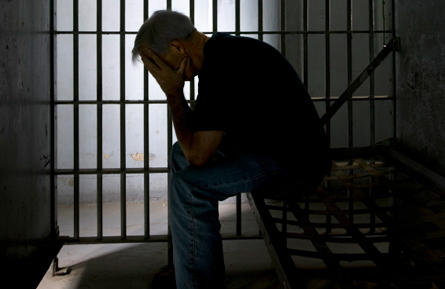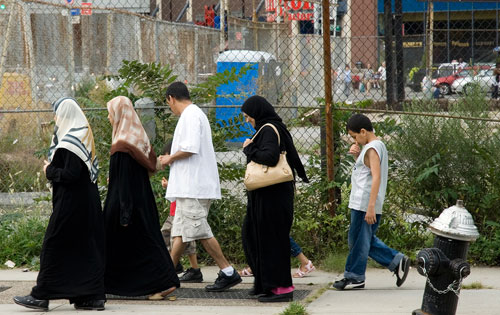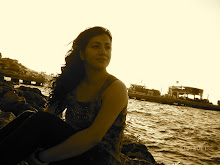TOPIC:
SUNDAY, MAY 16, 2010 14:01 ET
A troubling cultural gap
If today's young American Muslims can't relate to their imams, where will they turn?

Reuters
Imam Husham Al-Husainy talks to Muslim youth at the Karbalaa Islamic Education Center in Dearborn, Mich., in March.
Ishak Khan, 17, wants to know if it's OK to get a tattoo in his religion. He also wants to know if it's OK to write rap songs and if it's OK to have a Muslim girlfriend.
Like many of his Muslim American contemporaries, Ishak isn't quite sure how to balance his religion with American culture. He does talk to friends about these issues, but he'd really like to speak with an adult who understands both American culture and Islam. But he can't really talk to his parents because they're very traditional, and he's definitely not going to that imam "straight out of Bangladesh" who gives the boring sermons at the Queens, N.Y., mosque he attends once a month.
"I don't think I can connect or talk to him, because he's not from here," says Ishak, who was born here to Bangladeshi parents. "I can't even tell him that I write music, 'cause he's just gonna tell me that it's bad. And if I tell him about getting a tattoo, he's gonna tell me that it will look dirty." And about the girlfriend? "He's gonna say it's haram [forbidden]."
Says the aspiring rapper: "I just want a cool person who I can ask questions to and who can give me a reasonable response."
Ishak's dilemma is one familiar to many Muslim Americans of his generation. Going to a mosque to pray or to receive Islamic education is an integral part of their lives. Though not all young Muslims are mosque-goers, those who do go often look to their local imams for guidance, only to be turned off by the cultural gap that exists between them. This has caught the attention of some Muslim community members, who fear that too many young American Muslims are left feeling alienated and frustrated.
Some Muslims are voicing their opinions and calling for change. They would like imams, who tend to be older, male and "imported," to be able to connect with a generation of Muslims raised in America. They also want mosques, which have the potential to develop leadership and community-building skills among young Muslims, to make youth outreach a priority. Failing to address these issues, they fear, could sever the connection between a generation of American Muslims and their religion.
There may be another fear, too. Abdul Malik Mujahid, an imam and author, has written that young people who feel marginalized or alienated can constitute "a breeding ground for extremism."
A common frustration among young Muslim Americans is that many imams speak to their congregations in languages other than English, often to accommodate immigrants who are more comfortable with their native tongue. (Some imams themselves may be more comfortable speaking in their native tongues as well.) This can leave the younger generation, which often has limited or no knowledge of its parents' mother tongues, uninterested.
Muntasir Sattar, 30, who works with many Muslim youths as a program coordinator at the South Asian Youth Action organization in New York, has seen how this causes the imam's message to go right over the heads of younger congregants -- even when it's aimed straight at them.
"A lot of Khutbahs [sermons] on Fridays are about youth, about vices and virtues and the importance of staying on the right path," he says, "but from a youth's perspective, they're like, 'OK, that's great, but you're talking in Arabic, or Urdu or Bengali, and I don't speak that language!" he says.
Ishak admits that he's dozed off more than once during sermons, usually when they've been delivered in Bengali. "I speak Bengali, but it would be better if it was in English. I'd understand it better," he says. He does remember one time hearing a great sermon in English about how praying to Allah can make life less stressful during trying times. "I had exams and I was so worried. I prayed to Allah that I would pass them and I did," Ishak recalls. He would like sermons to be about issues closer to his life.
Tania Ahmed, a 17-year-old high school senior, agrees that language is an issue. (Tania is not her actual name, which she asked be withheld.) "I don't care where [the imam] comes from, as long as he can communicate," she says. If the imam cannot speak in English, it hurts the youth who are seeking answers about their faith, Tania says. And she feels that some imams are too judgmental. "I know that some of them would react in a certain preachy way if I were to ask them about personal issues," she says. "They might even just shun you," she says. "I wouldn't really go to anyone outside my circle of friends."
But many imams believe it's their job to provide a rigidly Islamic viewpoint on issues and that even stylistic concessions to American culture are out of the question. Ben Yahya Abdel-Ghani, the director of the Flushing Muslim Center in Queens, says that when young people ask him for his advice, he has to answer according to the rules of Islam. Abdel-Ghani, 45, is from Morocco and has been living in the United States since 1997. Should a young person ask about whether it was OK to drink alcohol, his answer would be swift. "All kids know that alcohol is wrong," he says in slightly accented English. "Alcohol is prohibited -- so the discussion is almost closed."
Abdel-Ghani admits that youth don't often go to him for advice about personal matters, but, for example, if a young person were to confide to him that he or she might be gay (a situation he says he's never encountered), he would reply that being gay in Islam is not accepted. "Youngsters know that the answer will be that it is wrong," he insists. "They have to find a way to solve the problem. I don't think they will have the urge to say it to someone who is older."
Another issue complicating youth outreach is financial, with many mosques struggling just to pay their rent. Immigrant mosques in New York, for instance, are often run by working-class individuals and limited funds tend to be an issue. Sattar, the SAYA program coordinator, understands this and empathizes with these mosque officials, but he stresses that mosques should try to find room for youth programs even in their tight budgets. "Youth need opportunities to be active in their religious institutions," he says. "They need those roles, those opportunities, to shape the world."
Dr. Mahbubur Rahman, a professor of political science at the City University of New York who teaches a course called Islam and Democracy, agrees. He thinks that this is a way young Muslims can steer clear of fringe Muslim groups that may have extremist agendas or whose teachings are not in line with mainstream Islam. For example, the "Lackawana Six," a group of young Muslim American men from Buffalo, ended up in a militant training camp in Afghanistan. They were apparently recruited by a man named Kamal Derwish, who preached a radical brand of Islam and who won them over through meetings in his apartment. (Derwish was ultimately killed in a CIA mission in Yemen.)
A symbol of hope for Muslim American reformers can be found in the heart of Manhattan's West Village, the home base of a man who epitomizes the kind of spiritual leadership that so many young American Muslims yearn for.
Khalid Latif, 27, serves as the first-ever Muslim chaplain at the school's Islamic Center, a place that he boasts of running on progressive values rooted in authentic Islamic sources. Latif graduated from New York University with degrees in political science and Middle Eastern studies and attended the Hartford Theological Seminary briefly, then became the executive director of the Islamic Center at 24. He is also the youngest chaplain ever hired by the New York Police Department, brought in to cater to the spiritual needs of Muslim officers and civilian employees.
Latif says he understands why some young people don't feel comfortable going to religious places. Born and raised in New Jersey, he doesn't have fond memories of the local mosque he attended as a teenager. Back then, he had long hair and no beard, a violation of Muslim tradition, and congregants would accuse him of attending services just to mingle with the girls. "People weren't very nice to me," he recalls.
Membership at NYU's Islamic Center has increased significantly since he took over. He is well-liked and popular among students. One Pakistani-American student named Raza, after finishing his afternoon prayers, wrote "I love the I.C." on a whiteboard near the center's entrance. Raza credits Latif for uniting Sunni Muslims and Shia Muslims in prayer, something the student, who is of the Shia sect, had never experienced before. "It was really special," he says. "It was an incredible feeling."
Students come to Latif to seek his advice about any and all issues, including some that are traditionally deemed "haram," or forbidden, in Islam. They appreciate his easygoing attitude and feel comfortable enough to talk to him about sexuality, depression, mental-health issues, domestic violence, relationships and even experiences of rape.
So is Latif a rare breed of imam? "I'm not like Nemo, alone in this ocean of loneliness," he says. As the Muslim community begins to respond to the needs of its diverse members, he believes, more imams who espouse progressive values that are in line with Islamic teachings will emerge. "As needs have changed, as dynamics have changed, I think it's just a logical trend to a people who are well versed in how this society functions that they are going to be stepping into roles as community activists and leaders and specifically, at times, even imams," Latif says.
Sitting on the floor of the large prayer room located in the basement of a white church that serves as the Islamic Center, he says: "What it means to be an imam is contingent upon a community's needs at the time." He is wearing blue jeans, a blue button-down shirt, has a trimmed beard and is wearing a black skullcap called a "kufi." "In some Muslim countries and in immigrant mosques, the idea isn't that the imam will be a community leader," he adds. "He's expected to just lead the prayers."
Latif isn't sure if it matters whether an imam was raised in the U.S., or if he's young or old. "It's hard to create an archetype on what an individual needs to be like that can deal with the diversity of some 8 million Muslims [in the U.S.]," he says. "Different people have their own preferences."
If a student confides to Latif that he or she might be gay, he won't claim that homosexuality is permissible in Islam. "But, like, it doesn't change the fact that we have kids or adults who are homosexuals," he says. "An outright denial of its existence causes us to have more issues than solutions."
After listening to a student talk about his or her background, he encourages the student to understand what his or her "life choice" means. "Some people will be nice to you, some people will treat you like garbage," Latif might say.
"With any issue, it's about, 'Where do we go from here?'" he says. "In Islamic tradition, you see numerous instances with men and women going to the prophet Mohammed, peace be upon him, about their sins. The relationship with the Prophet was such that you could speak with him and he wouldn't be judgmental. He would respond in a way that made the most sense for the person coming to him with the issue."
Being a young and progressive imam has its challenges, too. "Especially in religious communities, when somebody comes in and does it differently, you kind of have to legitimize yourself," says Latif. "You have to prove to people that they can take you seriously. Because you're dealing with religion. And if you're wrong, Muslims perceive that wrong means hell."
At first, he says, people thought that NYU's Islamic center was too liberal. But now he claims that those same people simply see the center as "accepting."
Young Muslims in America are clearly hungry for some spiritual guidance from the right people, and they're asking for some specific things. For one, they say, imams should be raised or should at least understand what it's like growing up in America. They also shouldn't be quite so judgmental. And being on the younger end, though not required, is desirable. They should also be able to speak English and be reasonably current with American culture and technology. Ishak, the 17-year-old aspiring rapper, says he's met another imam, a young, American man, who showed him some Islamic prayers on YouTube that he liked a lot. "I don't think my imam [from the Queens mosque] even knows what YouTube is," he notes.
Tania once heard Latif speak at a conference and she absolutely loved what he had to say. Latif spoke about peer pressure and about the challenges of being a Muslim teenager in America. Still, she doubts that she'd ever confide in any imam about her personal life. "Except," she says shyly, "maybe for Khalid Latif."




